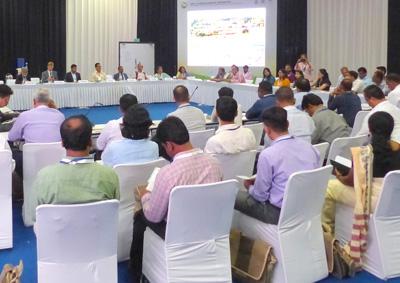Treatment of river catchments, agroforestry, sustainable agriculture key to addressing land degradation in India

At a side event of the UNCCD-COP organized by TERI, experts discuss solutions for restoring land
September 12, Greater NOIDA: Referring to India's commitment to sequestering an additional 2.5-3.0 billion tonnes of CO2 by 2030, Mr. Siddhanta Das, DG of Forests, India said, "The strategy to meet this goal necessitates 'landscape-based catchment treatment of major river systems and extending tree cover outside forests'. He added that the first such catchment treatment plan has been developed for the Ganges river by The Forest Research Institute (FRI), and similar plans are being developed for nine major river systems by Indian Council for Forestry Research and Education (ICFRE).
Speaking about agro and farm forestry, he further added, "India's net annual import of wood and wood-based products is Rs 42,000 crore. Encouraging farmers to grow tree outside forests can enhance incomes and accelerate the carbon sequestration process.'
To this, Dr JV Sharma, Senior Director, TERI pointed out that agroforestry does not receive adequate attention from policymakers, even though it can potentially meet nearly two-thirds of India's forestry-related NDC (Nationally Determined Contributions). He said that lack of good quality planting material, pricing and regulatory mechanisms are hindering the growth of agroforestry in India. Calling for coordination between Ministry of Environment, Forests and Climate Change and the Ministry of Agriculture, he said, "A minimum support price for agroforestry will encourage farmers to grow tree outside forests".
In her context-setting presentation, Dr Pia Sethi, Senior Fellow, TERI pointed out that forest degradation accounts for nearly 55% of the total cost of land degradation in India. Stating that India would need approximately Rs 3,000 billion to restore its land by 2030, she said, "The annual costs of land degradation are higher than the total cost of restoration. Thus, it makes both business and ecological sense to restore land.' She also reiterated the need for an integrative policy that looks at water, agriculture and forests together.
Speaking about India's initiatives in agriculture, Dr Alka Bhargava, Additional Secretary, Ministry of Agriculture said the government is keenly encouraging farmers towards the use of soil cards, micro-irrigation and crop diversification. Emphasizing that the shift towards organic farming will be a slow and gradual process, she said, "All mechanisms including direct benefit transfer are being considered to encourage farmers towards reducing their use of fertilisers and diversifying crops.'
The panel discussion also included a case study presentation by Rajal Bansal, District Magistrate of Dhamtari, Chhattisgarh, on land restoration-related efforts under the state government's Suraji Gaon Yojana initiative. Speaking about his administration's integrated efforts towards water conservation, livestock management, organic farming and backyard cultivation, Rajat Bansal said, "We have leveraged the traditional knowledge of the people of Chhattisgarh to control land degradation and enhance ecosystem services."
The panellists agreed that the UNCCD-COP has helped to recognize the scale of land degradation challenge and its linkages to climate change. Speaking about areas of cooperation between India and the United Kingdom, Dr Julian Wright, Environment Advisor, DFID, said "Strengthening existing management structures such as MGNREGA, improving research capacities and enhancing the role of private finance can help to address the land degradation challenge in India."
For further information, contact:
TERI - Dhawal Trivedi: dhawal.trivedi@teri.res.in
Edelman - Rakhi Aurora: rakhi.aurora@edelman.com

